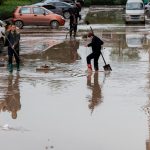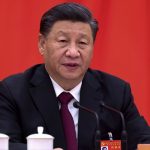Russian election days leave an imprint on the brain – the grainy CCTV from polling stations across the country.
In the Central Election Commission Headquarters in Moscow, there’s an impressive bank of monitors covering an entire wall beaming in the images from schools from the Russian Far East to Kaliningrad.
It’s a backdrop for all the journalists, busily propounding on all the possible permutations of Russia’s parliamentary electoral outcomes. Nail-biting it is not because there aren’t many.
On social media, there’s a stream of similar images of ever more absurd cases of election fraud. It’s par for the course in Russia, but it is always astonishingly blatant.
One example from the southern city of Krasnodar of an election observer being dragged out of a polling station on his rear because he raised the flag on electoral fraud.
Another from Kemerovo of a mysterious hand appearing from behind a Russian flag and stuffing votes into a ballot box as a woman stands in front trying to block the spectacle.
A strange situation in a district in the Volga region where the head of the local electoral commission decides to eat a piece of paper that appears to be the focus of a row with polling station staff. It may be a cliché but… only in Russia.
Russia election: Vladimir Putin’s party expected to secure emphatic win as polls close
Alexei Navalny poisoning: UK imposes sanctions on seven Russian FSB agents over novichok attack
Russian court bans groups linked to Putin critic Alexei Navalny
When I asked a local election committee member at a polling station in Central Moscow if he thought these elections were free and fair, he burst out laughing.
“I’m not allowed to answer that,” he said. “But they’re neither free nor fair.”
“Nowadays it becomes more and more important to vote, especially for young people,” said Dmitry who’d brought his family in to vote. “Because we believe that something needs to change.”
Hope springs eternal. But the communist party are celebrating tonight their best election results since 1996.
It’s not clear yet whether that has something to do with Alexei Navalny‘s Smart Voting strategy, which the Kremlin has tried its utmost to crush on the grounds that his anti-corruption foundation is an extremist organisation. It may well do.
The Smart Voting list backed many communist candidates simply because they looked most likely to be able to unite the vote against United Russia in each given constituency, even though the long-time communist party leader Gennady Zyuganov has been consistently vile about Alexei Navalny.
He may have to thank him now.
The communist success is also down to frustration with United Russia as a result of unpopular pension age reforms in 2018 (which the communists opposed), a sharp drop in real disposable incomes, food price hikes and a general sense of political stagnancy where even the communists look like fresh blood.
But they are still part of the system in Russia, fundamentally loyal to United Russia even if this does put fresh wind in their sails and a more rebellious stride in their step.
Change is not around the corner. Not yet. But even small political shifts can create broader ripples and reflect changes in the public mood.
The Kremlin will be watching and analysing it all closely, elections are always a weird form of Kremlin confidence building. The question is – after the heavy crackdown of the last few months – how it chooses to respond.






















